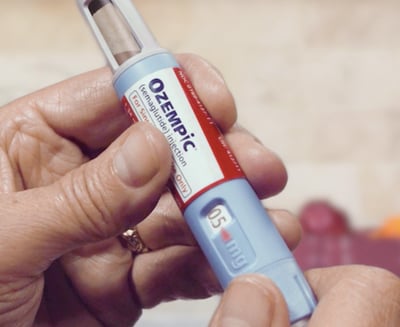FDA Warns Against Compounded Semaglutide for Diabetes, Weight Loss
By Susannah Chen
 The FDA has issued a warning urging people to avoid using off-brand or compounded formulations of the popular semaglutide medications Ozempic, Wegovy, and Rybelsus.
The FDA has issued a warning urging people to avoid using off-brand or compounded formulations of the popular semaglutide medications Ozempic, Wegovy, and Rybelsus.
Semaglutide medications like Ozempic, Wegovy, and Rybelsus, have become the subject of a global shortage, with demand for the trending drugs outstripping supply. As a result, some people have turned to compounding pharmacies for versions of the diabetes and weight loss medications. Now the FDA is cautioning consumers that these off-label versions could potentially be unsafe.
In a statement issued May 31 titled “Medications Containing Semaglutide Marketed for Type 2 Diabetes or Weight Loss,” the FDA referenced “adverse event reports” associated with some forms of compounded semaglutide. In particular, officials have called out compounded versions that may contain ingredients that are similar to the active ingredient semaglutide but chemically different because they are in salt form. The agency cautioned that it does not review these compounded semaglutide versions for safety or efficacy.
What is compounded semaglutide?
Compounded drugs are created by combining or altering ingredients to make medications tailered to the needs of a specific individual. There are roughly 7,500 compound pharmacies in the U.S. When the FDA’s drug shortage website lists a drug as “currently in shortage,” which is the case with semaglutide drugs Ozempic, Wegovy, and Rybelsus, then compounding pharmacies are permitted to buy semaglutide from pharmaceutical ingredient manufacturers, mix it with other compounds, and prepare a version of the drug if they meet certain requirements of the Federal Food, Drug, and Cosmetic (FD&C) Act. The agency doesn’t review these compounded versions for safety, effectiveness, or quality, however.
What is the difference between semaglutide and semaglutide sodium?
Some compounding pharmacies have been dispensing versions of the medication made with a different active ingredient called semaglutide sodium. The FDA has called out these versions in particular as potentially unsafe.
“Patients should be aware that some products sold as ‘semaglutide’ may not contain the same active ingredient as FDA-approved semaglutide products and may be the salt formulations,” the FDA wrote. “Products containing these salts, such as semaglutide sodium and semaglutide acetate, have not been shown to be safe and effective.”
Adverse events from some compounded forms of semaglutide
The FDA noted that it has received adverse event reports after patients used compounded semaglutide, and encouraged the public to report any additional adverse events to the FDA through the MedWatch Adverse Event Reporting Program.
“FDA has received reports that in some cases, compounders may be using salt forms of semaglutide, including semaglutide sodium and semaglutide acetate. The salt forms are different active ingredients than is [sic] used [in] the approved drugs, which contain the base form of semaglutide. The agency is not aware of any basis for compounding using the salt forms that would meet the FD&C requirements for types of active ingredients that can be compounded,” the FDA stated.
Does a generic version of Wegovy, Ozempic, or Rybelsus exist?
In its statement, the federal agency emphasized that there are currently only three FDA-approved semaglutide products – Ozempic and Wegovy, which are injectables, and Rybelsus, which is an oral tablet – all available only with a prescription, and that “there are no approved generic versions.”
“FDA is not aware of any basis for compounding a drug using semaglutide salts that would meet federal requirements,” the agency added.








